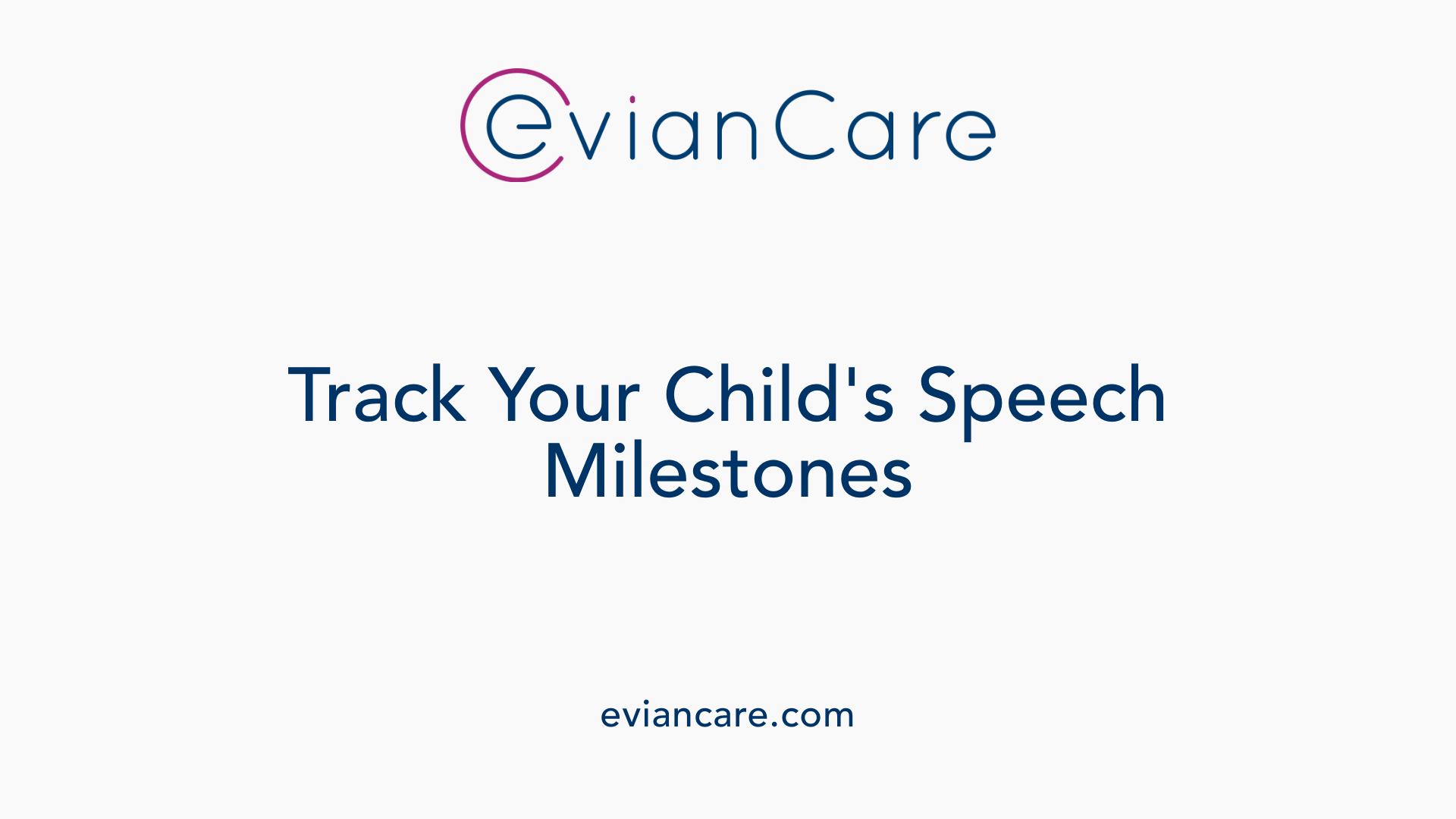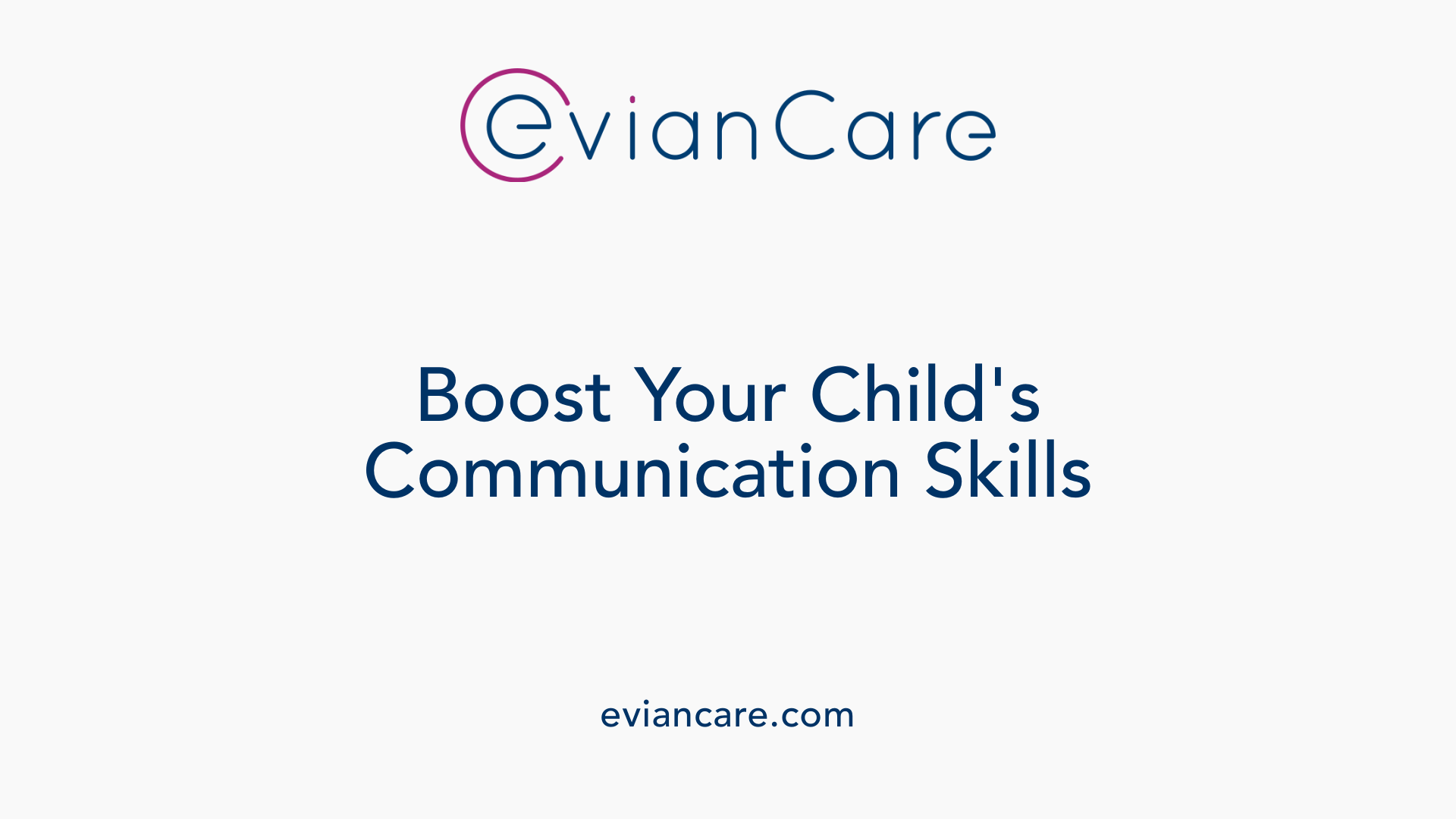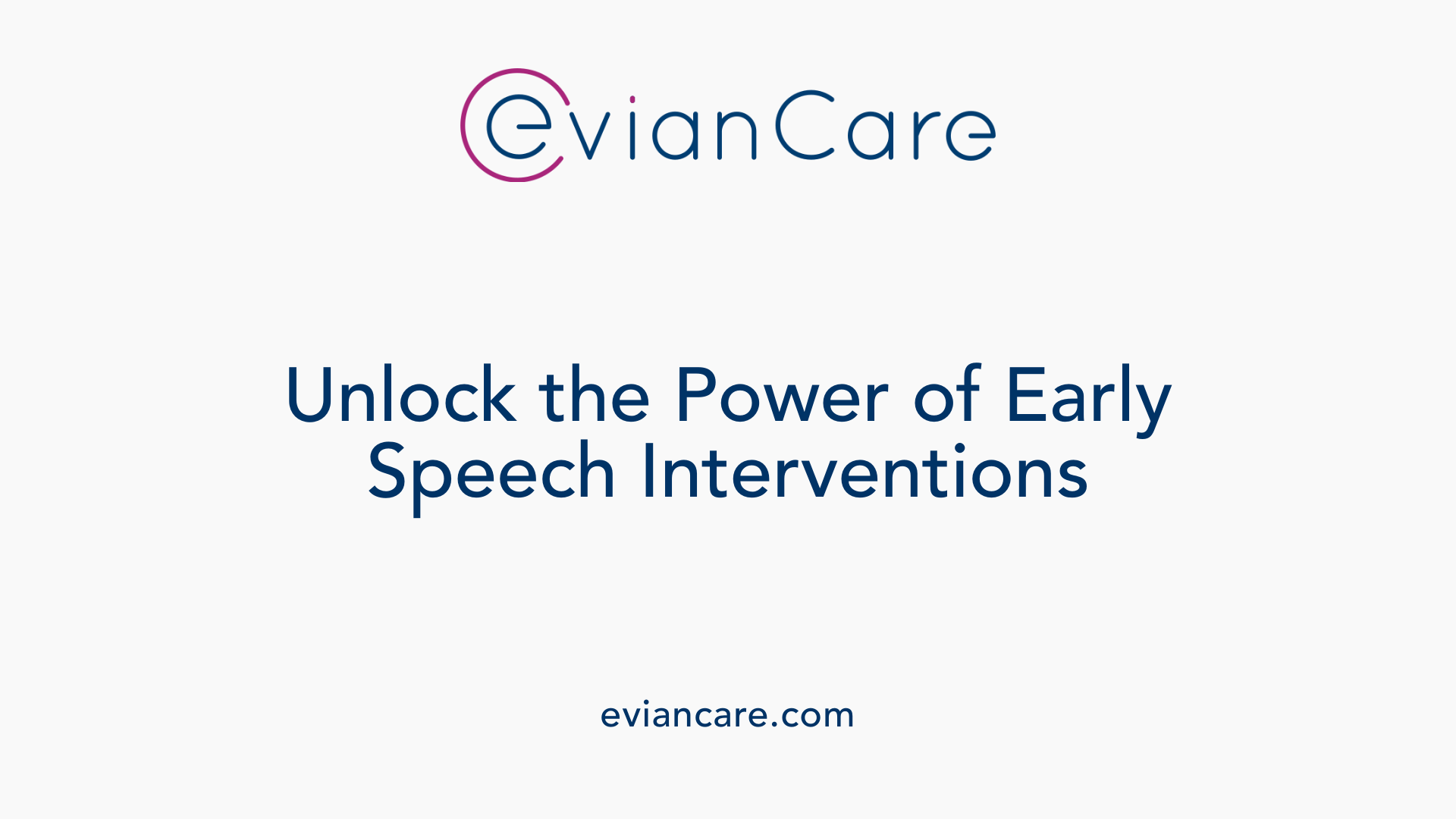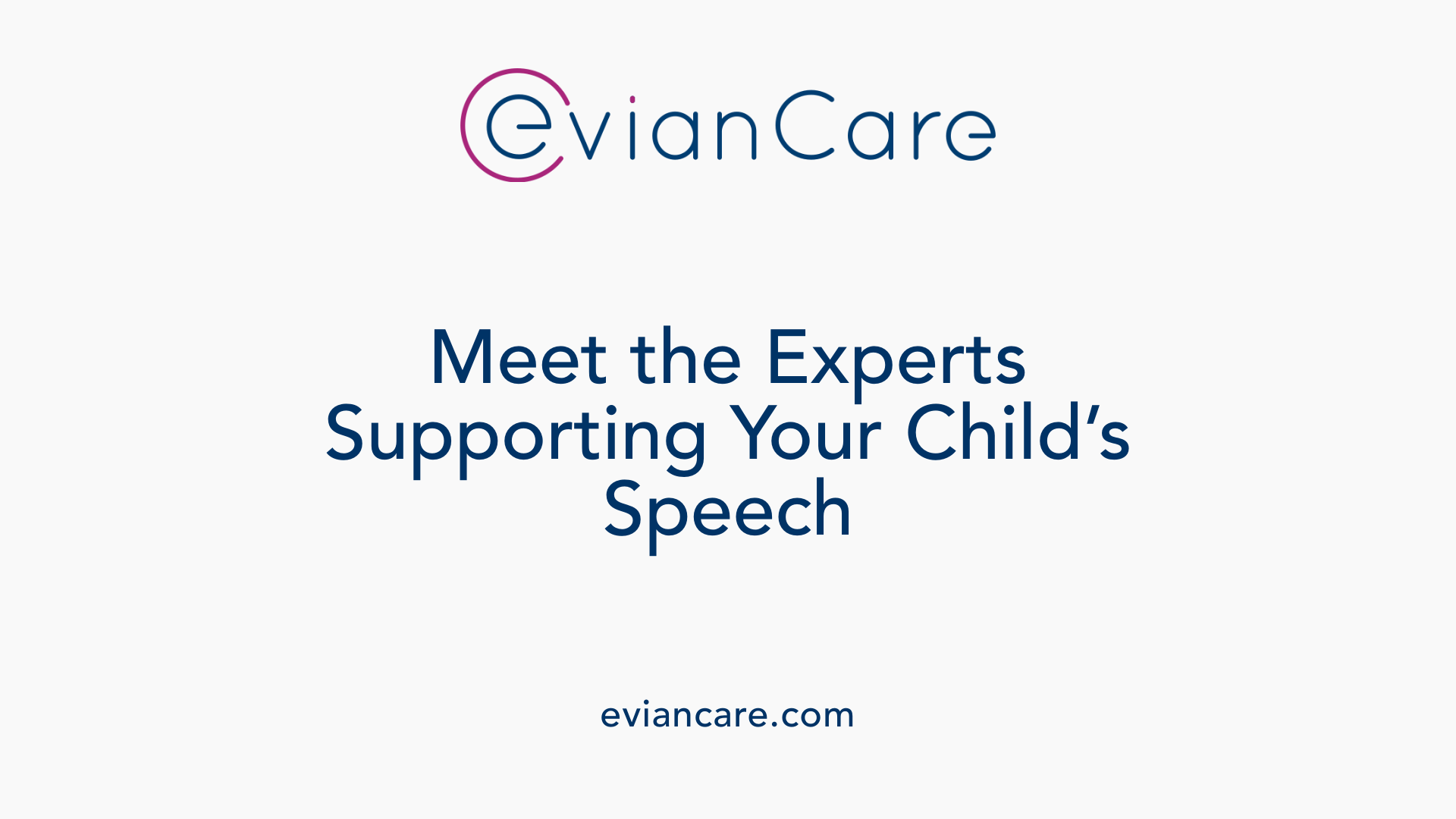
Understanding the Power of Early Intervention
Speech therapy plays a vital role in supporting children with speech delays, helping them overcome communication barriers that can impact their social, emotional, and academic development. Recognizing the importance of timely intervention, this article explores how speech therapy benefits children, the techniques involved, signs indicating a need for therapy, and the scientific evidence backing its success.
Developmental Milestones in Speech and Language

What are the developmental milestones related to speech and language in children?
Children typically reach important speech and language milestones from birth through age five, which lay the foundation for effective communication, learning, and social interaction.
In the early months, babies respond to sounds, turn their heads toward voices, and begin making cooing noises. By around 7 to 11 months, most infants start babbling, combining consonant and vowel sounds like "bababa" or "dadada."
Between 12 and 17 months, children usually utter their first meaningful words, such as "mama" or "bye-bye." They also start understanding simple instructions and can identify common objects or body parts.
From 18 months to 3 years, language develops rapidly. Children expand their vocabulary to include hundreds of words, start forming two- or three-word phrases, and can describe objects and actions. They also begin grasping basic concepts such as "in," "on," "big," and "little."
Between ages 3 and 5, children use longer sentences, tell simple stories, ask questions, and understand more complex instructions. They develop more advanced vocabulary and syntax, which reflects their increasing ability to communicate abstract ideas.
Development varies among children, but recognizing these milestones helps identify whether a child's speech development is on track or if early intervention may support their progress.
| Age Range | Typical Speech and Language Skills | Additional Notes |
|---|---|---|
| Birth to 6 months | Responds to sounds, makes cooing and gurgling sounds | Early recognition of hearing and speech abilities |
| 7 to 11 months | Babbles with consonant-vowel combinations | Foundations for speech development |
| 12 to 17 months | Says first words, understands simple instructions | Critical period for language acquisition |
| 18 months to 3 years | Expanding vocabulary, using two- to three-word phrases | Begins forming basic sentences |
| 3 to 5 years | Uses complex sentences, stories, and questions | Ready for school literacy and social skills |
Supporting speech development during these years through reading, talking, singing, and engaging in play can enhance a child's communication skills, ensuring they meet their developmental milestones effectively.
Recognizing Signs of Speech Delays in Children

What signs indicate that a child may need speech therapy?
Parents and caregivers should watch for specific signs that suggest a child might benefit from speech therapy. One of the earliest indicators is delayed speech development. For example, if a child has not started saying their first words by around 12 to 15 months or if they are using fewer than 50 words by the age of 2, it may be a sign to seek professional evaluation.
Difficulties with articulation are also common. If a child struggles to pronounce sounds correctly, forms incorrect words, or is difficult to understand, these could be signs of speech delays. Repeating sounds or words frequently, known as echolalia, as well as unintelligible speech, could indicate underlying issues.
Another important aspect is how well a child follows instructions. Challenges in understanding directions or responding appropriately can suggest receptive language delays.
Limited vocabulary growth, trouble forming sentences, and frequent use of fillers or pauses while speaking are common warning signs.
Social communication difficulties are equally important to note. Children who have trouble joining in conversations, interpreting social cues like facial expressions or gestures, or who avoid speaking altogether may need evaluation for speech or language disorders.
Early identification through observation and consultation can lead to more effective intervention. If these signs are present, parents should consider consulting with a pediatrician or a speech-language pathologist to determine if speech therapy would benefit their child.
Improvements in communication skills through early therapy can help prevent further academic, social, and emotional challenges, setting a strong foundation for future success.
How Speech Therapy Promotes Development

How does speech therapy support speech and language development in children?
Speech therapy plays a vital role in helping children improve their communication skills at various levels. It involves comprehensive evaluation and personalized treatment to address different speech and language issues. Therapists work on improving pronunciation, helping children produce sounds more accurately, which enhances speech intelligibility.
Moreover, speech therapy fosters vocabulary growth and understanding of language concepts. It strengthens expressive skills by teaching children to express their thoughts clearly and confidently. Receptive skills—like understanding instructions and questions—are also targeted to improve comprehension.
An important aspect of speech therapy is teaching alternative communication methods, such as gestures, sign language, and visual aids. These methods support children with severe delays or non-verbal communication, ensuring they have effective ways to express themselves.
Early intervention is especially critical as it leverages brain plasticity during childhood. This not only leads to better outcomes in speech and language skills but also positively impacts social interactions, emotional well-being, and readiness for school.
Furthermore, speech therapy enhances pragmatic or social language skills. Children learn to interpret social cues, take turns, and engage in peer interactions, which are essential for successful social relationships.
Overall, speech therapy equips children with practical communication tools, boosting their confidence, independence, and ability to participate fully in educational and social settings.
Techniques and Methods in Speech Therapy

What are common techniques used in speech therapy?
Speech therapy employs a variety of techniques tailored to individual needs to improve communication skills. One fundamental approach involves articulation exercises aimed at enhancing the production of speech sounds. Therapists often use modeling, where correct speech is repeated and recast to help children understand proper pronunciation.
Visual aids such as pictures, gestures, and cues support comprehension and reinforce learning. These tools make abstract concepts more concrete, especially for young children or those with specific learning needs.
Engaging activities like storytelling, singing, and play-based stimulation help motivate children and create a fun learning environment. These exercises foster language development while keeping children interested.
Structured conversational practices, including practicing turn-taking and sentence structuring, are used to build social communication skills. Positive reinforcement encourages children to participate actively and build self-confidence.
Specialized techniques such as self-talk, parallel talk, and wait time are employed to encourage children to express themselves and respond appropriately. Mouth and facial exercises help strengthen muscles involved in speech, and assistive technologies, like speech-generating devices, assist those with severe delays.
Therapists also adapt strategies for conditions like apraxia, aphasia, or swallowing disorders, using sensory cues or tactile feedback to improve motor speech skills. Overall, these methods combine behavioral, auditory, visual, and motor strategies to promote better speech, language, and communication.
The Impact of Early Intervention and Scientific Support

What are the benefits of early speech intervention?
Early speech therapy provides vital advantages by helping children develop crucial communication skills during a period when their brains are most adaptable. This early support can lead to clearer speech, better comprehension, and more effective social interactions. By addressing speech and language issues promptly, children can avoid the development of secondary challenges such as frustration, social difficulties, and academic struggles.
Furthermore, early intervention can significantly boost a child's confidence and independence. It encourages social engagement and fosters emotional well-being, which are essential for overall development. When started early, speech therapy also enhances cognitive skills like thinking and problem-solving, laying a solid foundation for lifelong learning.
Parents and caregivers play a critical role in this process. Through collaborative efforts, they learn strategies to support their child's progress at home. Early intervention is cost-effective as it often reduces the need for more intensive treatment later.
In sum, starting speech therapy early unlocks a child's full potential by promoting healthy communication, boosting social and emotional growth, and supporting academic achievement from a young age.
Role of Speech-Language Pathologists and Support Strategies

What role do speech and language therapists play in treating communication disorders in children?
Speech and language therapists, also known as speech-language pathologists (SLPs), are essential professionals in helping children develop effective communication skills. They begin by conducting detailed evaluations to identify any delays or disorders in speech, language, voice, or swallowing.
Following assessment, SLPs design personalized treatment plans that focus on the child's specific needs. These plans often include exercises like articulation drills, language expansion activities, and play-based therapies that make learning engaging. They also incorporate strategies to strengthen oral muscles, improve voice quality, and enhance social and pragmatic skills.
SLPs work closely with families, teachers, and other specialists to support the child's progress both in therapy sessions and at home. They educate parents on how to reinforce communication skills through daily interactions, reading, and play.
Early intervention by these professionals is crucial. Addressing speech and language issues early can significantly improve a child's confidence, academic performance, and ability to form social relationships. Overall, SLPs play a vital role in guiding children toward clearer speech, better understanding, and effective expression, laying a foundation for lifelong communication success.
Fostering Future Success through Early and Effective Speech Support
Investing in early speech therapy provides children with the critical communication skills they need for academic achievement, social integration, and emotional well-being. With trained professionals, evidence-based techniques, and active parental involvement, children can overcome speech delays, build confidence, and reach their full potential. Early intervention not only benefits individual development but also lays a strong foundation for lifelong success in personal and professional relationships.
References
- Speech Therapy for Children: What are the Benefits? - NAPA Center
- Early Intervention for Speech Delays: Why It Matters
- Speech Therapy: What It Is & How It Works
- 5 Benefits of Speech Therapy | September 06, 2023
- Advantages of Speech Therapy
- 7 Signs Your Child May Benefit from Speech Therapy
- In brief: What is speech therapy? - InformedHealth.org - NCBI
- Benefits of Early Intervention in Speech Pathology
- Sign Language and Therapies to Help Kids with Speech Delays












